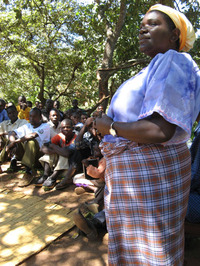
I spend 9 days in Malawi trying to turn deformed maize, witchcraft, and HIV into catalysts of change. Join me and my Face-to-Face AIDS Project and see how our ideas of charity evolve with on-the-ground experiences.
DAY 4: "WHAT DID YOU EXPECT? THIS IS AFRICA"
At breakfast at the lodge, three white South African businessmen are having a quiet discussion over eggs, toast, sausage, and three closed laptops. At another table, an older white man who looks like he's traveled a lot through the tropics sits with a younger Indian man with glasses. Both men are staring lazily at their laptops.
As I pass by, the older white man looks up and asks, "Any luck getting connected?"
I answer that I had wireless last night, but not this morning.
"It's been on and off ever since the rains a couple days ago. They say a wet branch is blocking the connection."
"I hear it's out in City Centre too," the man continues. "Must be shutting the whole place down."
"Must be a pretty big branch," I laugh.
"Crazy, isn't it?" he remarks, as he closes his laptop. And then he adds with a shrug, "But what can you expect? After all, this is Africa."
And there's a statement you'll hear everyday in Malawi. "After all, this is Africa..." is said in response to anything that's slow, late, malfunctioning, breaking down, isn't adding up, isn't rational, isn't sensible, is puzzling, perplexing, or absurd. At cocktail hour when people gather to talk about how their day went, this simple statement always makes an appearance. And usually repeatedly.
Why each day, as breakfast is served on that wonderful terrace, someone schedules a team of workers to make their way around the tables applying a foul, strong smelling floor polish with big scrub brushes.
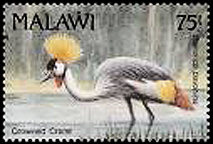 Why when you claim your bags at the airport, you open your suitcases for inspection, close them, and then move a mere ten feet where you're requested again to open them for inspection. And perhaps asked if you might have a gift for the customs officer.
Why when you claim your bags at the airport, you open your suitcases for inspection, close them, and then move a mere ten feet where you're requested again to open them for inspection. And perhaps asked if you might have a gift for the customs officer.
Why instead of the crowded post office, you instead opt to buy stamps at the best hotel in town, only to find that the clerk doesn't have the key to open the drawer. His manager appears fifteen minutes later to unlock the drawer and give you the stamp. But then the clerk has no change for your stamp and scurries off to find the manager again. That takes another fifteen minutes.
"After all, this is Africa...." While I try to avoid saying it, it's hard to avoid thinking it. For instance, we were in a budget and finance meeting at our Lilongwe office, and I'm wondering where our wonderful office director is. She's the most important person in this meeting.
"Do you know where Mara is?" I ask Mike, who must be the most gentle, honest person I know.
"Yes," Mike answers. "Mara's getting a cow."
"A cow?"
"Sure."
Mara lives in the city and has no farm animals. What's she doing with a cow? And why did this cow take priority over our budget and finance meeting?
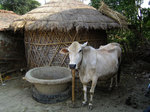
I suppose I could wonder why no one told us in advance that Mara wasn't coming to the meeting, but perhaps she and Mike thought that buying a cow is the most ordinary reason in the world.
Jolene, Jolene, Jolene, Jolene
This afternoon I heard Phil Collins by a local marketplace. I always hear Phil Collins here. And Bob Marley too, although "One Love" seems to belong here more than "Another Day in Paradise." And then there's Dolly Parton's classic, "Jolene." Hearing Dolly Parton while driving through villages of mud huts and fields of maize can seem strange.
But Dolly is popular in this part of Africa. It makes sense when you think about it. Dolly's vocals are clear and understandable. Her songs are about heartbreaks and displacement. Hoping for love and crying over lost love. Longing for one's hometown.
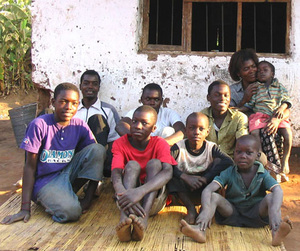 Malawians often talk about their longing for their tribal villages. HIV-positive Dorothy, a single mother of eight sons and a volunteer at the Tilerane Orphan Care Center, learned last August that her stomach pain was full blown cancer. By October, Dorothy was in agony. Her last wish was to return to her childhood village -- a bumpy, painful 20-hour trip. There she died a few days later, on October 20, 2009.
Malawians often talk about their longing for their tribal villages. HIV-positive Dorothy, a single mother of eight sons and a volunteer at the Tilerane Orphan Care Center, learned last August that her stomach pain was full blown cancer. By October, Dorothy was in agony. Her last wish was to return to her childhood village -- a bumpy, painful 20-hour trip. There she died a few days later, on October 20, 2009.
Dorothy's husband had died five years earlier from HIV that he got from another woman. A day before he died, the traditional African doctor ordered Dorothy to retrieve her husband immediately and take him home. The doctor didn't want anyone to die in his clinic -- that would not be good for business. So the husband leaned on Dorothy as she guided him out of the clinic and on to the dusty roads for the slow walk home. While the doctor had ordered him out, the husband probably wanted to die at home in any case. Just like Dorothy did last October.
I like Dolly Parton. I like her music, and I like who she seems to be as a person. Here are the words to "Jolene." I can definitely see how Malawian women can relate to the song. After all, this is Africa.
Jolene, Jolene, Jolene, JoleneI'm begging of you please don't take my manJolene, Jolene, Jolene, JolenePlease don't take him just because you can
You could have your choice of menBut I could never love againHe's the only one for me, Jolene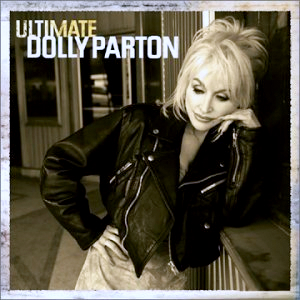
*****************Ken Wong is the director of the Face-to-Face AIDS Project, a documentary and charity-focused 501(c)3 nonprofit based in Brooklyn, New York. To donate the Face-to-Face AIDS Project, visit the Contact & Donate page at www.facetofaceaids.org.
